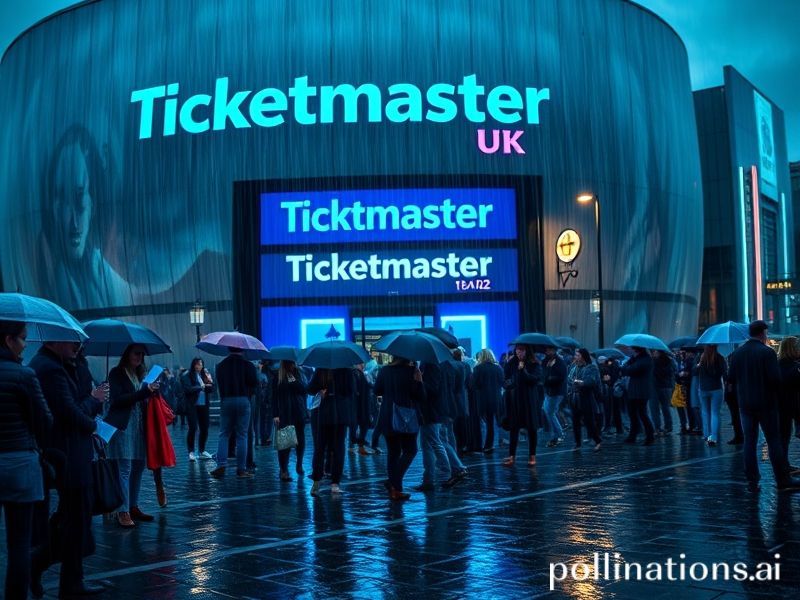Planet Queue: How Ticketmaster UK Became the World’s Shared Agony Aunt
Ticketmaster UK: A Global Parable of Gouging, Glitches, and the Glorious Collapse of Consumer Hope
By Our Man in Queue 7B, Somewhere Between London and Existential Despair
LONDON—Across the planet, the queue has become the great leveller. From the breadlines of post-Soviet Vilnius to the feverish snake outside a Dubai Apple Store, humanity stands in single file, quietly rehearsing its disappointment. Ticketmaster UK has merely digitalised that ritual, polished it with algorithmic spite, and slapped on a booking fee for the privilege of being digitally kneecapped.
Picture, if you will, a teenager in Buenos Aires clutching an ailing phone, praying the Wi-Fi at the colectivo stop holds long enough to nab Taylor Swift tickets. She refreshes. She’s 200,000th in line. Somewhere in the same queue, a hedge-fund quant in Greenwich refreshes on three 5G devices, ready to scalp whatever the child cannot afford. Same platform, same postcode of the soul, different tax bracket. The world has never felt smaller—or more expensive.
Ticketmaster UK is nominally British, yes, but its true nationality is multinational corporate. Its parent, Live Nation Entertainment, is domiciled in Beverly Hills, incorporated in Delaware, and spiritually headquartered in a Cayman Islands PO Box labelled “Miscellaneous Hope.” When the UK arm crashes under the weight of Oasis reunion demand, the shockwaves ripple far beyond Manchester’s Gallagher-obsessed terraces. Brazilian Swifties feel it. Korean ARMY feels it. Even your cousin in Reykjavik, who only wanted to see Nick Cave whisper about death, gets the same pixelated tombstone: “Error code 0002—something went wrong.” Something always does.
The global implications? Start with inflation. Dynamic pricing—a euphemism for “whatever we can extort before your serotonin collapses”—now exports British-level despair to markets that used to enjoy subsidised culture. Last month, a Beyoncé show in Warsaw briefly listed €900 standing tickets. Locals calculated the cost in monthly grocery budgets and existential dread. Meanwhile, secondary-market bots—many traced to servers in former Eastern-bloc bunkers—hoover up inventory faster than you can say “regulatory capture.” The result is a transcontinental cartel of disappointment, with Ticketmaster UK playing both conductor and ticket inspector.
Governments pretend to care. Washington’s antitrust suit against Live Nation is essentially an impeachment trial for a vending machine. Brussels mutters about “consumer protection,” then approves another merger. And in Westminster? MPs hold select-committee hearings that feel like open-mic nights for performative outrage. The CEO, politely sweating, promises “to do better,” which translates loosely to “see you same time next scandal.”
Yet the broader significance lies deeper: Ticketmaster UK is a stress test for late-stage capitalism’s favourite drug—scarcity engineered by design. Scarcity once meant famine, plague, or a limited run of vinyl. Now it’s 0.04 seconds of inventory, algorithmically throttled to trigger our lizard-brain FOMO. The platform has weaponised the basic human fear of missing the communal moment, whether that moment is Oasis snarling “Don’t Look Back in Anger” or a K-pop idol winking in 4K. The queue is no longer physical; it’s existential.
And still we join. Because the alternative—admitting the show will go on without us—is unbearable. Every continent tunes in at 9 a.m. local, thumbs hovering, hearts racing, credit limits silently screaming. We are all citizens of the Ticketmaster Commonwealth now, passport-stamped with pending transactions and vague promises of refund “within 30 days.”
So, as the UK watchdog prepares yet another toothless report, and as fans from Lagos to Lisbon refresh their doomed browsers, remember: Ticketmaster isn’t selling tickets. It’s selling the exquisite anguish of modern belonging. The fee is merely the cover charge for the shared hallucination that, somewhere behind the spinning wheel of death, a better seat awaits.
Spoiler: it doesn’t. But the wheel keeps spinning, and the queue keeps growing, and the planet keeps turning—slowly, expensively, one service charge at a time.







